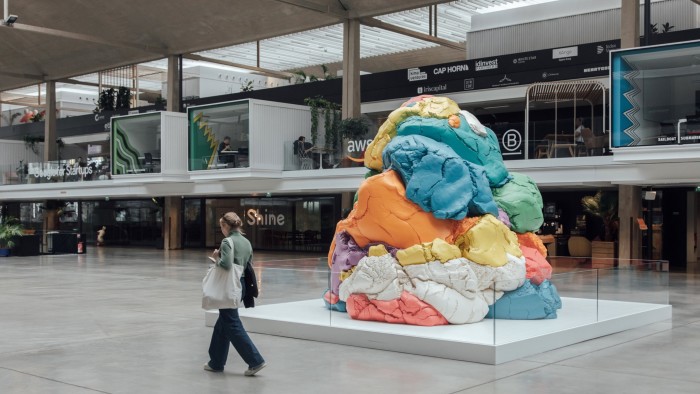Stay informed with free updates
Simply sign up to the European companies myFT Digest — delivered directly to your inbox.
Contrasting with the morose mood in much of France nowadays, optimism and ambition fill the air at the cavernous Station F business incubator in Paris. Since opening in 2017, the world’s biggest start-up campus has nurtured 7,000 businesses including two unicorns: the AI company Hugging Face, now based in the US, and the healthcare insurer Alan.
Talk with the founders of AI companies at Station F and it is hard to resist their enthusiasm for the technology’s potential and the attractions of France as a place to launch a company. Of the incubator’s 40 best-performing start-ups, 34 have AI at the core of their business. The rapid emergence of Mistral, the Paris-based AI start-up now valued at $6bn that has developed one of the world’s most impressive foundation models, has also given them much to cheer about.
“Europe can create competitive AI models today,” Xavier Niel, the French investor in both Station F and Mistral, recently told the FT. “I think we can create big things with a few hundred million euros.”
Much is going right in France’s start-up world. The country’s education system trains an endless chain of talented engineers. Paris is vying with London as Europe’s top AI hotspot. France’s business culture has been transformed over the past two decades, making it acceptable, even fashionable, to become an entrepreneur. Venture capital is more readily available than ever before. In spite of his troubles elsewhere, President Emmanuel Macron has been an active champion of the sector.
Unlike most big US AI companies, French AI start-ups favour open-source models that encourage greater collaboration and broader access to the technology. That, they hope, will give them a competitive edge in applying AI to almost every sector of the economy.
But the question remains: can France’s vibrant tech sector overcome the political mess and economic uncertainty that are blighting the rest of the country?
Station F’s young start-up founders have few doubts. Historically, French entrepreneurs have been far more successful at building companies in the US than in France itself, but that is changing now, says Thomas Le Corre, chief executive of the edtech start-up Rakoono. He has studied at HEC business school in Paris and the University of California, Berkeley. “I strongly believe in European tech,” he says.
The country’s abundant technical skills are perfectly matched to the AI industry, making France a great place to build a tech business, adds Joel Belafa, chief executive of Biolevate, an AI-enabled therapeutic research company. “For a long time, France has built a culture of engineering,” he says. Similarly qualified engineers in the white-hot US market, he reckons, might cost five to eight times as much.
Still, the momentum in the French tech sector slowed last year, partly as a result of the political turmoil resulting from divisive parliamentary elections. Data from Sifted, the FT’s sister publication, showed that French start-ups raised just €3bn in the second half of 2024, down from €5.9bn in the first six months. The latest Global Startup Ecosystem Index ranks France as the eighth most successful start-up nation in the world, up from 12th in 2020 but still behind the UK, Sweden and Germany in Europe.
No matter how much progress the French tech sector has made, the US still exercises a powerful gravitational pull. The Parisian AI start-up Pathway announced last month that it was moving its headquarters to the US to be closer to its biggest customers. “We need to be in the room where it happens — and it happens in the Bay Area,” Zuzanna Stamirowska, Pathway’s co-founder, said.
Rumours swirl around Paris that Mistral will itself have to sell out to a giant US company if it wants the resources to become globally relevant, just as Britain’s DeepMind was bought by Google in 2014.
Unlike their competitors in the post-Brexit UK, France’s AI start-ups must contend with the higher regulatory burdens of the EU’s AI Act. But some entrepreneurs argue the legislation can help build trust and boost creativity. “This is not just negative for Europe. It can drive better innovation,” says Samuel Bismut, co-founder of Corma, a software licence management company.
Little can be achieved without such optimism and ambition. But having benefited from some helpful tailwinds over the past few years, the French tech sector is now facing stiffer headwinds. This year will test France’s entrepreneurial mettle as never before.



















+ There are no comments
Add yours